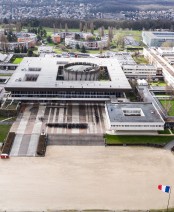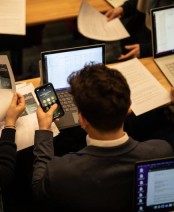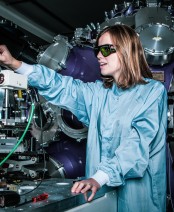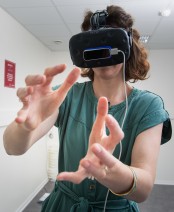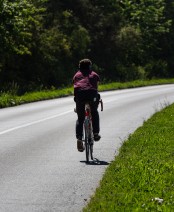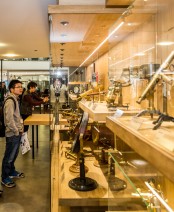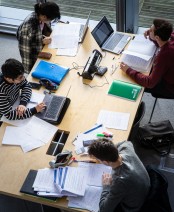Gerondeau - Safran Awards 2022: Entrepreneurship, a long-term challenge
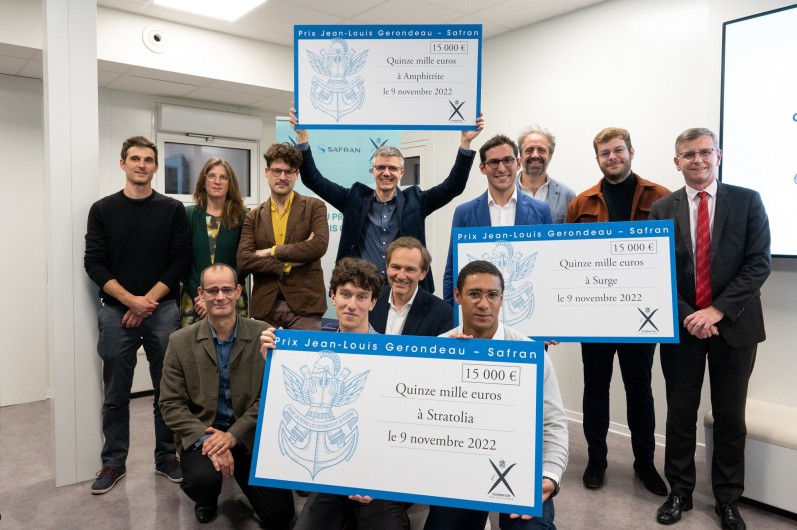
The 12th edition of the Jean-Louis Gerondeau - Safran Prize was awarded to three start-ups - Amphitrite, Stratolia and Surge - for their innovations in the fields of maritime transport, land observation and health respectively.
Created in memory of Jean-Louis Gerondeau (X62), the Gerondeau - Safran Prize is worth a total of 45,000 euros, to be divided among a maximum of three projects. Its aim is to bolster the emergence or maturation of innovative projects led by teams from the entrepreneurial ecosystem of the École Polytechnique and the Institut Polytechnique de Paris, of which École Polytechnique is a founding member.
Since its inception, it has supported start-ups that now have a strong presence in France and internationally such as SourceLAB (2011), Stilla Technologies, Wandercraft and Ynsect (2012), FeetMe and Sensome (2013), Airthium, Cardiologs and Dreem (2014), DeepColor, Ecov and Wingly (2015), Donecle and Forssea Robotics (2016), Seald, Vittascience and Zeta Technologies (2017), Hinfact, Mila and Okomera (2018), InBolt, Neolithe and Omini (2019), Escape, Hiperssys and Tarmac Technologies (2020), Beyond Aero, Manitty and PaIRe (2021).
Speaking at the 12th Award ceremony, Rémi Dangla (X 2005, Master's and PhD at École Polytechnique ), co-founder of Stilla Technologies and winner of the Gerondeau - Safran Prize in 2012, emphasized the special nature of the projects selected for the Gerondeau - Safran Prize and the importance of the prize for its recipients.
"If you win this prize, it's because you're involved in an industrial project, a technological project, an ambitious project where you have the will to change an industry, to change uses, to change... the world I hope; but that requires a lot of time and money," he said.
An entrepreneurial venture in an industrial or technological field necessarily takes time," he said. "It's a field of entrepreneurship that is not often highlighted, and not one of ultra-fast success stories, with founders who become multimillionaires in two or three years with an app and millions of users around the world."
Underlining the contribution of the Gerondeau - Safran Prize, Rémi Dangla said it was "an essential first step" in a long-term challenge.
"It may look modest with a check for a few thousand euros, but it's a check that can be used to leverage financing... and above all, it gives you access to the entire ecosystem (of the École Polytechnique): you're at the heart of an exceptional technological platform, surrounded by exceptional researchers, and you have access to an exceptional network of entrepreneurs, industrialists and financiers, and this is something that must be leveraged on," he continued, talking to the newly awarded start-upers.
Below is a brief presentation of the three projects that won the 2022 Gerondeau-Safran Prize:
*Amphitrite. Created by Evangelos Moschos (PhD X 2022), a specialist in artificial intelligence, Briac Le Vu, oceanographer and research engineer, and Alexandre Stegner, CNRS researcher and professor at École Polytechnique, Amphitrite aims to decarbonize the routes of merchant ships, which represent 3% of global CO2 emissions. The start-up, which emanates from the Dynamic Meteorology Laboratory (CNRS, École Polytechnique - IP Paris, ENS, Sorbonne University), develops patented methods for analyzing and merging satellite ocean data to optimize shipping routes. Amphitrite works in collaboration with major stakeholders such as Louis Dreyfus Armateurs or CNES, and plans to launch in 2023 a demonstrator for the optimization of maritime routes in the Mediterranean Sea.
*Stratolia. Created by Louis Hart-Davis (X 2018), Hugo Marchand (X 2018) and Dylan Herry, Stratolia develops an Earth observation and imaging service using maneuvering stratospheric balloons that move with the wind to target the area to be studied. Equipped with a gondola - designed within École Polytechnique Drahi-X Novation Center prototyping space - linked to software to control their direction, these balloons could be used for multiple applications: detection of forest fires, monitoring of maritime traffic or military theaters of operations, response to a crisis such as an earthquake...
*Surge. Each year, nearly 8 million surgical operations are performed in France. One in five results in post-surgical complications that may require re-hospitalization. To anticipate and reduce these complications, Brice Gaudillière (X 1997), associate professor at Stanford, and Julien Hédou (X 2015) created Surge and are developing a patented diagnostic solution based on the analysis of the patient's immune system in the pre-surgical phase. The Surge team, which includes doctors and engineers in France and the United States, began a clinical trial in September 2022 in partnership with Hôpital Foch in France and aims to commercialize its solution by 2025.
